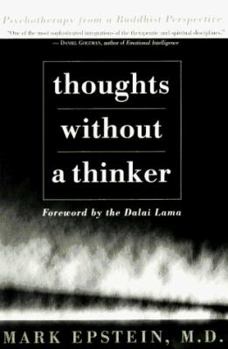Thoughts Without a Thinker: Psychotherapy from a Buddhist Perspective
Select Format
Select Condition 
Book Overview
An insightful investigation of how Eastern spirituality can enhance Western psychology, with a foreword by the Dalai Lama. As patients and therapists find themselves reaching for new solutions to... This description may be from another edition of this product.
Format:Paperback
Language:English
ISBN:0465085857
ISBN13:9780465085859
Release Date:June 1995
Publisher:Basic Books
Length:256 Pages
Weight:0.64 lbs.
Dimensions:0.7" x 5.3" x 8.1"
Related Subjects
Buddhism Health, Fitness & Dieting Health, Fitness & Dieting Internal Medicine Medicine Philosophy Politics & Social Sciences Psychoanalysis Psychology Psychology & Counseling Psychotherapy Psychotherapy, TA & NLP Religion Religion & Spirituality Religious Studies Self-Help SpiritualityCustomer Reviews
4 ratings
Excellent foundation of his approach
Published by Thriftbooks.com User , 17 years ago
I read Epstein's book on Desire before this one. When I read this book I was struck by how foundational it is for the desire book. That said, it doesn't make this book less useful for the reader. Epstein, as always, mindfully approaches the subjects at hand with experience and theory offered up to help readers grasp the concepts. I found his approach of cultivating openness to feeling to be really insightful and helpful in dealing with some avoidant behaviors I have. I highly recommend this book to anyone who likes his other work or is looking for a different perspective.
A remarkable blend of Buddhism and psychology
Published by Thriftbooks.com User , 18 years ago
The first chapter of this book alone is worth the purchase price. I have it dogeared, and refer back to it frequently. The author uses the Buddhist Wheel of Life as a metaphor for states of pschological suffering. His explanations are both clear and intriguing. This book will interest students of psychology and Buddhism alike.
a book that keeps on giving
Published by Thriftbooks.com User , 21 years ago
I picked this book off the shelf in 1995, when it was published, and have read it about five times since. Although I have an advanced degree and am used to difficult books, I found it very challenging, though readable and interesting. I don't think I developed a coherent sense of the profound and helpful ideas in "Thoughts Without a Thinker" until my third or fourth read. I'd like to thank Mark Epstein for the 20 years of experience, study, practice, thought, and compassion he put into this book. In our anti-intellectual culture it's a pleasure to read a consummately intellectual book that is packed with feeling, humanity, and a dynamic sense of purpose and discovery. It's reductive to say what I got out of this book, and, in a way, against the spirit of the book. But what I derived from my readings is a profound argument (that has stayed with me, really helped me) for not taking myself, my "tragedies," or, even, anyone else's, too much to heart. To understand that I and my culture burden me with a sense of identity and history that are simply irrationally heavy; to understand that many of my "burdens" can be eased by blending analysis and understanding with a less rational "bare attention" and letting go. Are you berating yourself for anything? Epstein's marvelous quotes from Buddhist texts speak eloquently for him: "Things are not what they seem. Nor are they otherwise. Deeds exist, but no doer can be found." It's amazing how much the reviewers of this book agree with one another. I think this speaks to the tremendous integrity of Mark Epstein's effort in this book. Among other things, "Thoughts Without a Thinker" inspires me to try (as non-neurotically as possible) to create something as excellent in my life.
The best of East and West
Published by Thriftbooks.com User , 24 years ago
I found this book not only enlightening but very practical. The introduction to the fundamentals of Buddhism in the first section is clear, easy to read, and well-thought-out -- I've read a lot of Buddhist texts and commentary on my own, but this summary pulled it all together for me. His discussion of the practice of meditation was extremely helpful -- although the best way to learn how to meditate is to DO it, this provided some useful guidelines, and was very reassuring for us perfectionists who tend to get hung up in "Am I doing it right?"! While the final section would probably be most useful to those who practice psychotherapy, or to their clients, I found it thought-provoking and fascinating to read. This isn't just a book for specialists; it has something to say to anyone who's interested in human psychology or spiritual development (which, Epstein might say, are fundamentally the same thing).





